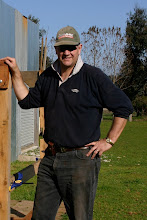There is one from the Australian Forest Growers that makes a lot of sense. The person who wrote it is measured and careful, but the recipe for disaster comes through:
Psuedo science + Politics + Bureaucratic caution = Disaster
This recipe for disaster afflicts us in multiple spheres. To avoid the charge that I'm either right wing - or left wing - let me use three examples side by side (and try to offend everyone equally).
Example disasters | ||
Victorian bushfires | Industrial food | Global financial crisis |
Underlying ‘pseudo’ science | ||
Environmental sciences | High input, industrial agriculture | Modern finance and risk management theory |
Politics | ||
The green vote | Cheap food | Too big to fail |
Bureaucratic failure | ||
Inaction on fuel reduction | Skewing of the regulatory system in favour of industrial food | Deregulation and self regulation of financial sector |
Result | ||
Fuel build-up leading to catastrophic fires | Local food systems are disadvantaged by an excess of caution while industrial food systems are subsidised and their externalities socialised | The profits of excessive risk taking are ‘earned’ by the finance sector – while the inevitable losses are socialised |
In each case there are alternatives to the psuedo science that has come to dominate the politics - but we've exercised our democratic choices or allowed stakeholder manipulation of our democratic choices - to the point of disaster. Bureaucrats follow the politics - as, to a degree, they must.
In each case the system turns out to be more complex than we though - ahhh - complex systems again.



